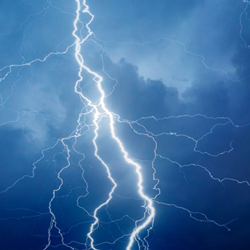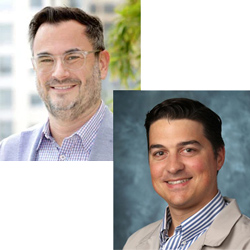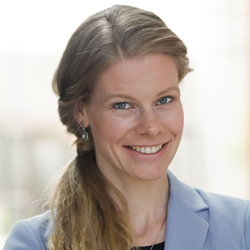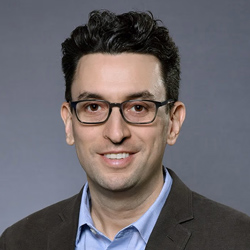Events
Past Event
WED@NICO SEMINAR: Lightning Talks with Northwestern Fellows and Scholars!
Northwestern Institute on Complex Systems (NICO)
12:00 PM
//
Lower Level, Chambers Hall
Details

NICO is hosting a lightning talk seminar each term as a part of our Wednesdays@NICO seminar series. Northwestern graduate students and postdoctoral fellows are invited to participate. To sign up for future lightning talks, please visit: https://bit.ly/2lRqSXK
Lightning Talk Speakers:
○ Sugat Dabholkar - PhD Candidate in the Learning Sciences program at the School of Education and Social Policy, Northwestern University.
Title: Emergent Systems Microworlds to teach and learn about complex emergent phenomena
Abstract: Learning and reasoning about complex systems is not simple. Both novices and experts often fall into the trap of level-slippage while reasoning about complex natural phenomena. Level-slippage is the confusion that arises when one expects emergent macro-level patterns to be similar to local micro-level patterns. Such confusion is people’s source of a deep misunderstanding of several patterns and phenomena in the world.
In my work, I seek to address this issue for high school science students by combining two powerful design approaches in Learning Sciences, namely, agent-based modeling of emergent systems and constructionism. We call this design approach Emergent Systems Microworlds (ESM). This approach is based on Wilensky and Papert’s restructuration theory (2010), which argues for the importance of representational infrastructure for changing fundamental aspects of knowledge encodings in a disciplinary domain. In this talk, I will discuss how agent-based restructurations in an ESM allow learners to develop fundamentally deeper insights into complex phenomena.
In an ESM-based curriculum, students explore and learn about emergent phenomena, using agent-based computational models that are designed in NetLogo (Wilensky, 1999) in the form of a microworld. In such models, an agent is a computational object with particular properties and actions. An ‘emergent’ phenomenon is modeled in terms of agents and their interactions. Microworlds are encapsulated open-ended computational exploratory environments in which a set of concepts can be explored, through interactions that lead to knowledge construction. In this talk, I will present some examples of ESM-based curricula that I designed for high school students to learn about genetics and evolution, two fundamental ideas in biology. I will discuss how the agent-based representational architecture in the ESMs allowed the students to engage in reasoning about complex systems principles in the context of the phenomena they were studying.
Bio: Sugat Dabholkar is a doctoral candidate in the Learning Sciences program at the School of Education and Social Policy, Northwestern University. His work involves designing technology-enhanced learning environments for learning scientific thinking, computational thinking, and complex systems thinking. Over the past four years, Sugat has developed several computational agent-based models, many of which have been incorporated into curricular units for high school students. He has conducted Professional Development programs for teachers focusing on designing Computational Thinking integrated STEM curricular units. These curricular units have been used in school settings in the US as well as in India.
○ Xuan Ma - Postdoctoral Fellow at the Feinberg School of Medicine, Northwestern University
Title: Probing motor control during naturalistic movements for extending BCI use
Abstract: Most existing sensorimotor and brain computer interface (BCI) studies have investigated the mapping from motor cortex (M1) to muscles by training monkeys to perform a few instructed movements in highly restricted conditions. Motivated by the demand of extending those in-lab studies to a wider realm, we propose to explore motor control during more natural movements of unrestrained monkeys. We simultaneously recorded M1 neural activity and electromyograph (EMG) wirelessly while the monkey was in a plastic telemetry cage in which it could perform various free-form movements. We then investigated the features of these signals and the consistency of the relationship between them. In this talk, I will describe progress we have made and challenges we are facing to extend BCI use in more naturalistic contexts, and will also introduce our efforts with deep learning methods to address those challenges.
Bio: Xuan Ma is currently a postdoctoral fellow in Feinberg School of Medicine, Northwestern University. He received the Ph.D. degree in control science and engineering from Huazhong University of Science and Technology, Wuhan, China, in 2017. His research interests include cortically-controlled functional electric stimulation, neural motor control system modeling, and biomedical signal processing.
○ Suman Kalyan Maity - Postdoctoral Fellow at the Kellogg School of Management, CSSI and NICO
Title: Winners, Losers, and Future Achievement
Abstract: One of the most robust findings on human performance is that past achievement predicts future achievements. Indeed, prior achievements may reflect underlying, differentiating characteristics rendering past winners more predictably outperforming their non-winning counterparts in future competitions. Further, the Matthew effect posits that past victories bring reputation and recognition that can translate into tangible assets, which increase the chance for future victories. Hence even if the deck was not stacked against some in favor of others, positive feedback operating on arbitrary initial advantage can increasingly set apart winners from losers. These mechanisms lead to one fundamental principle with crucial implications: Between past winners and losers, it is the former that are more likely to win in the future. Indeed, partly due to the robustness of this principle, the idea of selecting on winners has become one of the most commonly used heuristics in identifying and nurturing talents across a remarkably wide range of domains. In this talk, we systematically test against the principle of selecting between winners and losers across various settings. We observe that whenever there existed a reward based milestone (being on the podium, entering the main draw of a Tennis tournament etc.), the athletes who had just missed it ended up outperforming the athletes who narrowly achieved the milestone in future endeavors.
Bio: Suman Kalyan Maity is a Postdoctoral Fellow at the Kellogg School of Management, The Center for Science of Science & Innovation (CSSI), and NICO.
○ Rebeka O. Szabo - Pre-Doctoral Fellow at the Kellogg School of Management, Northwestern University
Title: The Micro-Dynamic Nature of Team Interaction
Abstract: Teams have become a popular organization form since well-functioning task-focused groups are basic pillars of successful organizations. While there is much interest in contemporary social science in understanding team processes that lead to efficiency, most of these researches rely heavily on self-reported data yielding static and potentially biased information and tends to overlook actual interaction processes. We propose a novel approach that allows portraying a nuanced, complex picture of problem-solving group behavior by measuring performance dynamics as it evolves in real-time, in a controlled environment. The research aims to explore how collaboration networks of small project teams evolve across time and team members, and how it relates to successful task performance. We investigate interaction patterns in escape rooms, where all teams are video recorded during the task-solving process in the same experimental environment. We expected that homogeneous distribution of interaction ties across time and team members fosters successful problem-solving. Concerning the impact of the initial social roles on the dynamics of the interaction pattern, we hypothesized that flexible, less hierarchical team structures favor for problem-solving. This research aims to advance the new science of teams' by focusing on the network micro-mechanisms that allows us to treat teams as dynamic, adaptive, task-performing systems.
Bio: Rebeka O. Szabo is a visiting Pre-Doctoral Fellow at the Kellogg School of Management. She is a PhD candidate at the Central European University's Department of Network and Data Science.
About the Speaker Series:
Wednesdays@NICO is a vibrant weekly seminar series focusing broadly on the topics of complex systems and data science. It brings together attendees ranging from graduate students to senior faculty who span all of the schools across Northwestern, from applied math to sociology to biology and every discipline in-between.
Live Stream:
Time
Wednesday, March 4, 2020 at 12:00 PM - 1:00 PM
Location
Lower Level, Chambers Hall Map
Contact
Calendar
Northwestern Institute on Complex Systems (NICO)
WED@NICO SEMINAR: Todd Florin and Nelson Sanchez-Pinto, Lurie Children's Hospital of Chicago "Transforming Research and Innovation for Acutely Ill Children"
Northwestern Institute on Complex Systems (NICO)
12:00 PM
//
Lower Level, Chambers Hall
Details

Speakers:
Todd Florin, MD, MSCE, Associate Division Head for Academic Affairs & Research, Division of Emergency Medicine, Ann & Robert H. Lurie Children’s Hospital of Chicago; Professor of Pediatrics (Emergency Medicine), Northwestern University Feinberg School of Medicine
L. Nelson Sanchez-Pinto, MD, MBI, Attending Physician, Critical Care, Ann & Robert Lurie Children’s Hospital of Chicago; Associate Professor of Pediatrics (Critical Care) and Preventive Medicine (Health and Biomedical Informatics), Northwestern University Feinberg School of Medicine
Title:
Transforming Research and Innovation for Acutely Ill Children
Abstract:
We will present an overview of the new Center for Pediatric Acute and Critical Care Research and Innovation (PACCRI) at Lurie Children's Hospital and its goal of fostering and facilitating ambitious, high-risk/high-reward research collaboration between clinicians and engineers, computer scientists, and data scientists. We will present two areas of active research by PACCRI faculty that may overlap with NICO faculty expertise: (1) predicting pneumonia in the emergency department, and (2) modeling hospital strain and resource allocation to prevent patient deterioration.
Speaker Bios:
Dr. Todd Florin is Professor of Pediatrics in the Division of Pediatric Emergency Medicine at Lurie Children’s Hospital of Chicago and Northwestern University Feinberg School of Medicine. He is Associate Division Chief for Academic Affairs & Research for the Division of Emergency Medicine at Lurie, Scientific Director of Research Development at Stanley Manne Children’s Research Institute, and Co-Director of PACCRI. Dr. Florin's research program aims to improve the diagnosis, management and outcomes of children with common, serious infections, with a current focus on lower respiratory tract infections. Complex challenges that Dr. Florin is tackling include heterogeneous and ill-defined phenotypes, lack of readily measurable reference standards, and unreliable clinical measurements. Current work centers on development of risk stratification tools and use of biomarkers to predict and improve outcomes in children with pneumonia at the point-of-care. His work has also centered on resource utilization, variation in care, antimicrobial stewardship, and use of clinical trials to improve treatments for respiratory tract infections in children. He is PI of an R01 from NHLBI to develop and validate a pediatric pneumonia risk score across 14 pediatric emergency departments, in addition to Co-PI of a 19-site clinical trial evaluating antibiotic treatment strategies in children with pneumonia funded by PCORI. He is co-PI on 2 multinational prospective cohort studies through the Pediatric Emergency Research Network (PERN) - one focused on pneumonia and the other on COVID-19 in children presenting for emergency care.
Dr. Nelson Sanchez-Pinto, MD, MBI, is a pediatric critical care physician and clinical informatics specialist. He is an Associate Professor of Pediatrics (Division of Critical Care) and Preventive Medicine (Division of Biostatistics and Informatics) at Northwestern University and Ann & Robert H. Lurie Children’s Hospital of Chicago. His NIH-funded research focuses on applying data science and informatics tools to improve the care of children with sepsis and other acute and critical care conditions. He leads several large-scale data sharing initiatives and data collaboration projects both nationally and internationally, including co-leading the team that derived and validated the new Phoenix criteria for sepsis in children. He is one of the founders and past chairs of the PICU Data Collaborative, which collects granular, anonymized electronic health record data from critically ill children from 26 institutions in the US.
Location:
In person: Chambers Hall, 600 Foster Street, Lower Level
Remote option: https://northwestern.zoom.us/j/92586384543
PW: NICO26
About the Speaker Series:
Wednesdays@NICO is a vibrant weekly seminar series focusing broadly on the topics of complex systems, data science and network science. It brings together attendees ranging from graduate students to senior faculty who span all of the schools across Northwestern, from applied math to sociology to biology and every discipline in-between. Please visit: https://bit.ly/WedatNICO for information on future speakers.
Time
Wednesday, February 25, 2026 at 12:00 PM - 1:00 PM
Location
Lower Level, Chambers Hall Map
Contact
Calendar
Northwestern Institute on Complex Systems (NICO)
Data Science Nights - February 2026 - Speaker: Siqiao Mu, Engineering Sciences and Applied Mathematics
Northwestern Institute on Complex Systems (NICO)
5:30 PM
//
M416, Technological Institute
Details

FEBRUARY MEETING: Thursday, February 26, 2026 at 5:30pm (US Central)
NEW LOCATION:
ESAM Conference Room, Tech M416
2145 Sheridan Road, Evanston, IL 60208
AGENDA:
5:30pm - Meet and greet with refreshments
6:00pm - Talk with Siqiao Mu, Ph.D. Candidate, Department of Engineering Sciences and Applied Mathematics, Northwestern University
TALK TITLE:
Gradient Algorithms for Machine Unlearning
ABSTRACT:
Machine unlearning algorithms aim to efficiently remove data from a model without retraining it from scratch, in order to remove corrupted or outdated data or respect a user's "right to be forgotten." Since empirical unlearning heuristics can be unreliable, we desire "certified" machine unlearning algorithms, which are theoretically guaranteed to achieve probabilistic indistinguishability between the unlearned model and the model retrained on the retained data samples. While several works have proposed second-order unlearning algorithms, first-order methods such as gradient descent (GD) or stochastic gradient descent (SGD) algorithms are far more computationally tractable for large neural networks. We propose "Rewind-to-Delete," a first-order unlearning algorithm that is also black-box, in that it can be applied to trained models without costly precomputation. We prove certified unlearning guarantees and derive privacy-utility-complexity tradeoffs for both the GD and SGD versions.
DATA SCIENCE NIGHTS are monthly meetings featuring presentations and discussions about data-driven science and complex systems, organized by Northwestern University graduate students and scholars. Students and researchers of all levels are welcome! For more information: http://bit.ly/nico-dsn
FUTURE DATES:
Data Science Nights will be held on Thursday evenings in the winter and spring terms, with future dates on March 19, April 30, and May 28, 2026.
Time
Thursday, February 26, 2026 at 5:30 PM - 7:30 PM
Location
M416, Technological Institute Map
Contact
Calendar
Northwestern Institute on Complex Systems (NICO)
WED@NICO SEMINAR: Ágnes Horvát, Northwestern School of Communication
Northwestern Institute on Complex Systems (NICO)
12:00 PM
//
Lower Level, Chambers Hall
Details

Speaker:
Ágnes Horvát, Associate Professor, Department of Communication Studies, Northwestern School of Communication
Title:
TBA
Abstract:
TBA
Speaker Bio:
Ágnes Horvát is an Associate Professor in the Department of Communication Studies, (by courtesy) the Computer Science Department of the McCormick School of Engineering, and (also by courtesy) the Department of Management and Organizations of the Kellogg School of Management.
Her research seeks to measure, understand, and forecast the collective behaviour of networked crowds in large-scale socio-technical systems. On the one hand, her current projects investigate the impact of network embeddedness and diversity on scholarly communication. On the other hand, she works on identifying expressions of collective intelligence and opportunities for innovation in crowdsourcing communities. Her research group also develops empirical and theoretical methods to support creativity and predict success in culture industries. This work lies at the intersection of computational social science and social computing. It uses an interdisciplinary data-driven approach that builds on techniques from network science, machine learning, and statistics.
Location:
In person: Chambers Hall, 600 Foster Street, Lower Level
Remote option: https://northwestern.zoom.us/j/96701776160
PW: NICO26
About the Speaker Series:
Wednesdays@NICO is a vibrant weekly seminar series focusing broadly on the topics of complex systems, data science and network science. It brings together attendees ranging from graduate students to senior faculty who span all of the schools across Northwestern, from applied math to sociology to biology and every discipline in-between. Please visit: https://bit.ly/WedatNICO for information on future speakers.
Time
Wednesday, March 4, 2026 at 12:00 PM - 1:00 PM
Location
Lower Level, Chambers Hall Map
Contact
Calendar
Northwestern Institute on Complex Systems (NICO)
WED@NICO SEMINAR: Steven Franconeri, Northwestern University "Point Taken: A gamified Intervention that Creates Enlightened Disagreements"
Northwestern Institute on Complex Systems (NICO)
12:00 PM
//
Lower Level, Chambers Hall
Details

Speaker:
Steven Franconeri, Professor of Psychology, Weinberg College of Arts & Sciences; Professor of Management and Organizations, Kellogg School of Management, Northwestern University
Title:
Point Taken: A gamified Intervention that Creates Enlightened Disagreements
Abstract:
Should we drop standardized testing for college or Ph.D. admissions? Allow athletes to join teams based on gender identity? When organizational and public policies bind behavior, human coexistence requires a way to determine that collective policy. Because individuals and like-minded groups have incomplete information, constrained strategies, and biased perspectives, thoughtful debate on those policies is critical. Unfortunately, those debates too often degrade into chaotic fights.
Point Taken provides a scalable solution by translating best practices in conflict resolution and critical thinking into a structured dialogue that can be learned and played in 30 minutes. In this interactive session, you'll play a short game to feel its effects.
Players replace persuasion with a common goal of discovering why they disagree. Dialogue then unfolds thoughtfully and calmly, through chains of short written reasons and responses. We've tested the game extensively in schools and organizations, and conducted a formal pilot study. All show powerful improvements in the tone and quality of debate, across longstanding and strongly-held disagreements. I’ll give background on best practices for enlightened disagreement, show how they translate to the game, ask you to play a game, and then ask for your advice on next steps.
Speaker Bio:
Steven Franconeri is leading scientist, teacher, and speaker on visual thinking, visual communication, and the psychology of data visualization. He is a Professor of Psychology in the Weinberg College of Arts & Sciences at Northwestern, Director of the Northwestern Cognitive Science Program, as well as a Kellogg Professor of Management and Organizations by Courtesy. He is the director of the Visual Thinking Laboratory, where a team of researchers explore how leveraging the visual system - the largest single system in your brain - can help people think, remember, and communicate more efficiently.
His undergraduate training was in computer science and cognitive science at Rutgers University, followed by a Ph.D. in Experimental Psychology from Harvard University, and postdoctoral research at the University of British Columbia. His work on both Cognitive Science and Data Visualization has been funded by the National Science Foundation, as well as the Department of Education, and the Department of Defense. He has received a prestigious National Science Foundation CAREER award, given to researchers who combine excellent research with outstanding teaching, and he has received a Psychonomic Society Early Career award for his research on visual thinking.
Location:
In person: Chambers Hall, 600 Foster Street, Lower Level
Remote option: https://northwestern.zoom.us/j/97198523514
PW: NICO26
About the Speaker Series:
Wednesdays@NICO is a vibrant weekly seminar series focusing broadly on the topics of complex systems, data science and network science. It brings together attendees ranging from graduate students to senior faculty who span all of the schools across Northwestern, from applied math to sociology to biology and every discipline in-between. Please visit: https://bit.ly/WedatNICO for information on future speakers.
Time
Wednesday, March 11, 2026 at 12:00 PM - 1:00 PM
Location
Lower Level, Chambers Hall Map
Contact
Calendar
Northwestern Institute on Complex Systems (NICO)

